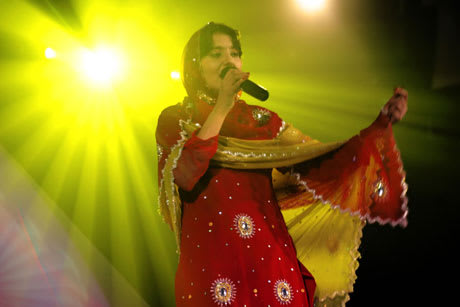"If there was no signing then the world would be silent," proclaims a blind little boy at the start of this remarkable film about freedoms and dreams.
In 1996, it was a crime in Afghanistan to dance, listen to music or watch TV. Muslim extremists by any measure, the Taliban suppressed all forms of personal expression in Afghan society and replaced it with oppressive dogma. That silence was lifted in 2004 when restrictions against these universal pleasures were loosened. Then, a TV show from the nation's capital, Kabul, sprung from this new climate of freedom, capturing the imagination of millions.
Young men (and a few women) line up to audition and a lucky few compete in the show. The winner takes home $5,000, which amounts to ten times the average annual salary in this impoverished nation. The audience chooses their favourite singer via text messaging, which gives Afghans their first taste of democracy and briefly unites this racially diverse country.
Afghan Star utilizes a tried-and-true structure of following several contestants, from their daily lives to the championship. One young man is a Sinatra-esque heartthrob. Another sings Western-tinged danceable pop. The key point is that these are men; it's fine for them to sing, "My love is a Hindu, but I am a Muslim, because of my love I sweep the temple, black magic man." But when Setera, a vivacious young woman, loosens her headscarf and adds a few dance steps to her routine, Afghan men go crazy. No, they don't shower her with kisses but with death threats and cries of "whore."
"Our souls were dead," says an older fellow who remembers the good old days of Western clothes and rock'n'roll, "Now we should wake them up." Afghan Star proves that waking up will take Afghans much longer than a morning but this film also makes Western audiences cherish the freedoms we take for granted.
(Zeitgeist)In 1996, it was a crime in Afghanistan to dance, listen to music or watch TV. Muslim extremists by any measure, the Taliban suppressed all forms of personal expression in Afghan society and replaced it with oppressive dogma. That silence was lifted in 2004 when restrictions against these universal pleasures were loosened. Then, a TV show from the nation's capital, Kabul, sprung from this new climate of freedom, capturing the imagination of millions.
Young men (and a few women) line up to audition and a lucky few compete in the show. The winner takes home $5,000, which amounts to ten times the average annual salary in this impoverished nation. The audience chooses their favourite singer via text messaging, which gives Afghans their first taste of democracy and briefly unites this racially diverse country.
Afghan Star utilizes a tried-and-true structure of following several contestants, from their daily lives to the championship. One young man is a Sinatra-esque heartthrob. Another sings Western-tinged danceable pop. The key point is that these are men; it's fine for them to sing, "My love is a Hindu, but I am a Muslim, because of my love I sweep the temple, black magic man." But when Setera, a vivacious young woman, loosens her headscarf and adds a few dance steps to her routine, Afghan men go crazy. No, they don't shower her with kisses but with death threats and cries of "whore."
"Our souls were dead," says an older fellow who remembers the good old days of Western clothes and rock'n'roll, "Now we should wake them up." Afghan Star proves that waking up will take Afghans much longer than a morning but this film also makes Western audiences cherish the freedoms we take for granted.
